Women Igniting Change®
In a post pandemic world, employees are demanding that their leaders do more than just lead the business. They are looking for their companies to provide a culture of purpose and possibility, navigate changing societal expectations and build a sense of community and belonging. Leaders need to elevate and engage their people by connecting personal values with those of the entire organization, and at the same time inspire collaboration, innovation and results. Robbin Jorgensen, Founder and CEO of Women Igniting Change®, is your host. A former corporate executive who has worked with women leaders in 31 countries on 6 continents, she believes that unleashing the contribution of women is one of the key drivers to moving business and humanity forward. Join Robbin every Monday as she dives into the intersection of business results, women’s leadership and social responsibility. She’ll share interviews with decision makers, provide tangible strategies, highlight women change makers and more as she inspires you to take action…for yourself, your organization and our world.
Episodes
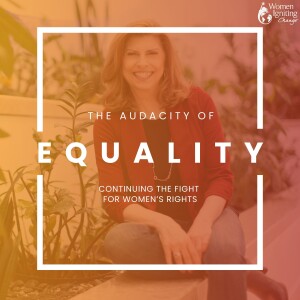
Monday Jul 22, 2024
Monday Jul 22, 2024
“I want to share this keynote with you because we stand at a critical moment in time for women’s rights. And it is going to take all of us standing up and speaking out in order to stop the erosion that all of the women before us fought so hard for,” says Robbin Jorgensen. In this episode of Women Igniting Change, Robbin reflects on the Seneca Falls Convention, the first women’s rights convention in America held 176 years ago. She shares her experience delivering the keynote at the 170th anniversary in 2018, highlighting the ongoing struggle for women’s rights.
Robbin’s emotional journey through the historical sites of Seneca Falls connects deeply with the bravery of the women who fought for our rights. She underscores the progress made and the work still needed, urging listeners to rise, overcome self-doubt, and make meaningful impacts. With examples of trailblazing women like Rosa Parks, Rachel Carson, and Nancy Brinker, Robbin calls us to action, emphasizing the responsibility to consider the impact of our actions on future generations and continue the legacy of the first wave of women’s rights advocates.
Quotes
“We’ve come so far since the days that they demanded the right to vote and to be treated as equal citizens. And, ladies and men, we still have work to do. With everything that they created and all of the progress that’s happened, it’s been 170 years and we are still shouting to be heard in boardrooms, in workplaces, and in communities around the world.” (03:49 | Robbin Jorgensen)
“170 years ago, they had pens and voices. And look at the extraordinary milestones that they were able to change, to create, to enact. They did all of this without the telephone, without mass communication, without planes, and without social media.” (04:43 | Robbin Jorgensen)
“We still have these powerful tools of pens and voices, and the resources to use those tools to impact millions of people with our message in a matter of minutes. We can connect instantly to women on the other side of the world, share our stories, and better understand the human experience. In developing countries, women are still fighting for their right to an education, for equal access to decent jobs, and to be able to think, act, and be in the world as themselves, independent of any man.” (05:03 | Robbin Jorgensen)
“Those limiting beliefs are not your truth. Your truth is that you are meant to shine your light and show up as the fullest expression of who you are as a human being.” (08:24 | Robbin Jorgensen)
“This is our moment in history to pick up the mantle and be the next wave, to advocate and fight for women’s rights. We are the next wave who will not allow the opinion of others to drown out our own voice. We are the next wave who will fight for our rights in the U.S. and for women around the world. We are the next wave who will no longer allow gender inequality to define our reality. We are the next wave who will complete the work towards gender equality that began 170 years ago right here where you stand. I say we because I am right there with you. We're in this together.” (09:22 | Robbin Jorgensen)
Links
Connect with Robbin Jorgensen (She/Her):
Website: https://womenignitingchange.com
LinkedIn: https://www.linkedin.com/company/women-igniting-change/
LinkedIn: https://www.linkedin.com/in/robbinjorgensen/
Facebook: https://www.facebook.com/robbin.jorgensen/
Declaration of Sentiments
Women's Rights National Historic Park
Podcast production and show notes provided by HiveCast.fm
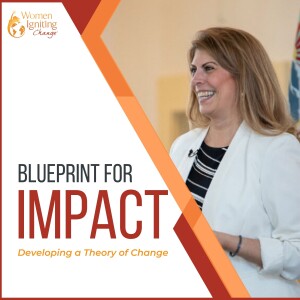
Monday Jul 15, 2024
Monday Jul 15, 2024
Hey, changemakers! Today, Robbin introduces an invaluable framework to help you organize and realize the social impact you aim to achieve. In this episode of Women Igniting Change, she guides you through a seven-step process called the Theory of Change model, using an organization focused on reducing food insecurity as an example.
In the links below, you’ll find an accompanying worksheet with various examples of how companies have implemented this model.
Throughout the exercise, you’ll examine the core aspects of your operation and envision your ideal outcomes. You’ll determine the internal changes you want to implement for your beneficiaries, identify the problems and needs your organization will address, and evaluate the resources and activities required. This dynamic framework is designed to evolve with your ongoing research.
Ready to make real change in the world? Let Robbin be your guide as you begin this journey.
Quotes
“A ‘theory of change’ model helps you, in a snapshot, identify what you’re actually going to achieve. So, it can be seen as both a process—which it is, it’s a seven-step process—and also a product. So, it’s kind of like a road map that helps you articulate the changes you want to make in the world and how you plan to achieve it.” (0:54 | Robbin Jorgensen)
“It links your activities to your outcomes and makes it really clear how and why your program will be effective.” (1:14 | Robbin Jorgensen)
“It’s so crucial to create a theory of change model to begin with when you want to affect any type of social change in the world. It tells a common story. This ensures that everyone involved in your social impact understands the big picture and where their individual efforts fit in. And it also brings together really diverse perspectives.” (2:31 | Robbin Jorgensen)
Links
Connect with Robbin Jorgensen (She/Her):
Website: https://womenignitingchange.com
LinkedIn: https://www.linkedin.com/company/women-igniting-change/
LinkedIn: https://www.linkedin.com/in/robbinjorgensen/
Facebook: https://www.facebook.com/robbin.jorgensen/
Podcast production and show notes provided by HiveCast.fm
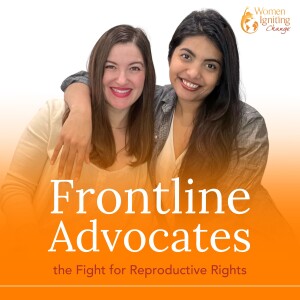
Monday Jul 08, 2024
Monday Jul 08, 2024
“Reproductive health includes so much more than just abortion, yet that’s all people think about because it’s been so politicized,” says Pari, who along with Eve, is working to combat mis-and dis-information about reproductive rights. Recognizing that the majority of Americans under 30 use social media as a legitimate new source, and that there was a lack of pro-choice presence across the platforms, the two women provide education and awareness building about reproductive rights on their social media channel @gemma_talks. This begins with clarifying the differences among reproductive rights, reproductive health and reproductive justice, respectively. It continues by reiterating that, since “the fall of Roe,” the consequences of denying women their reproductive rights are dire, and they affect everyone in ways they often don’t realize.
Social accountability presents a unique set of challenges. Whereas traditional advocacy is more focused, Pari and Eve have to design their message for an audience which varies wildly in terms of education and awareness. They work to help build sexual reproductive healthcare ecosystems which include everyone from health service providers to funders to advocacy groups and social movements, all of which remain vulnerable in a shifting political landscape where funding is limited. Still, they are hopeful that through their “vigilante activism” they will reach and transform tomorrow’s change-makers and in doing so, ultimately have a lasting impact on policy.
Quotes
“This is an arena where genuine change needs to be made for women to be able to truly self actualize to their full potential.” (05:41 | Pari)
“Quite frankly, women are tired. We’re tired. Advocacy work is important because it helps reignite people’s energy. It helps them remember their voice again and that they have something to fight for. When you add in the public health lens, it really highlights that nothing exists in a vacuum. Every health issue intersects with race, with income, with environment, just to name a few, and public health makes it clear that women’s issues aren’t just women’s issues. They affect everybody.” (10:48 | Eve)
“Social accountability is so important. In regular reproductive health programming, social accountability tools are exceptionally useful for driving civic engagement, building relationships between community members and duty bearers, and facilitating the creation of action plans and generating collective responsibility.” (21:39 | Pari)
“Advocacy on social media is made additionally complicated by the fact that your audience can be absolutely anyone. Normally, advocacy’s targeted, but on social media, there isn’t a baseline for someone’s awareness of an issue, or level of engagement, or even level of investment, and, frankly, even education level. You have to design your messages in a way that speaks to a broad depth of comfort with that issue.” (24:37 | Pari)
“One thing that people don’t think about, though, is how abortion bans make it more dangerous for women who genuinely want to get pregnant. So, some of my friends who very much want a baby are scared to get pregnant because if anything goes wrong, their life may be at risk depending on their zip code.” (27:07 | Eve)
Links
Connect with Pari and Eve
Instagram: @gemma_talks
TikTok: @gemma_talks
Connect with Robbin Jorgensen (She/Her):
Website: https://womenignitingchange.com
LinkedIn: https://www.linkedin.com/company/women-igniting-change/
LinkedIn: https://www.linkedin.com/in/robbinjorgensen/
Facebook: https://www.facebook.com/robbin.jorgensen/
Podcast production and show notes provided by HiveCast.fm
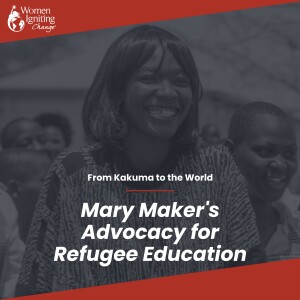
Monday Jul 01, 2024
Monday Jul 01, 2024
“Do you even know we exist? Do you have an understanding of refugee camps?” asks Mary Maker who was once a refugee from South Sudan. Mary never forgot the harsh realities of the Kakuma camp in Kenya. With her firsthand experiences of limited access to higher education and employment, she turned her trials into action. While teaching in the camp, she seized an opportunity to study at Bridge2Rwanda, which enhanced her skills before attending St. Olaf College in Minnesota. Her journey inspired her to co-found Elimisha Kakuma, a college preparatory program tailored for the refugees at Kakuma, using education as a means to empower and rebuild lives.
In today’s episode of Women Igniting Change, Mary joins host Robbin Jorgensen to discuss the formidable challenges faced by refugees, especially young women, in pursuing education. She shares insights from her TED Talk and advocacy efforts that are pivotal in garnering university support for her program. Mary also reflects on the empowering realization of education’s role in transforming lives.
Tune in to explore how Elimisha Kakuma is striving to meet the UN’s “15 by 30” pledge, aiming to enable 15 percent of refugees to access tertiary education by 2030, perpetuating a cycle of opportunity for future generations.
Quotes
“You would see their eyes light up. Every night in the camp we would sit on a mat and all the older folks would tell us stories of home, something to keep us connected. And our mothers would cook food from home because everything tasted like war, and they wanted us to feel a taste of home.” (6:17 | Mary Maker)
“I really hated to assimilate, I hated to learn languages, and it should be a fun thing, but for me it was a sign that I might move next. I was never sure that this was going to be permanent. (7:49 | Mary Maker)
“One time one of the students asked me, ’You talk so passionately in class and about education. Why are you still in the camp? Why aren’t you in college?’ They know the dead end. They know there’s a dead end. A lot of refugees have graduated high school and they don’t have any place to go.” (16:52 | Mary Maker)
“The biggest challenge was, ‘How do we reach universities?’ Because, number one, they would say, ‘OK, we don’t trust you.’ There is trust that needs to be built. And this is where my advocacy comes in. I have a Ted Talk. I am a UN ambassador. This is my credential. I will knock at every university door to let them see what the camp is like.” (30:01 | Mary Maker)
“I challenged every university; there were 300 universities in the room. I said, ‘Do you even know we exist? Do you have an understanding of refugee camps?’ because we easily can be a part of the monolith of international students, but we’re not. We don’t have a home to go back to. We have ten times the problems that a regular student who is applying.” (30:44 | Mary Maker)
Links
Connect with Mary Maker:
https://marymaker.org/
https://www.elimishakakuma.org/
https://www.unhcr.org/us/prominent-supporters/mary-maker
https://www.instagram.com/marymaker_43/
https://www.linkedin.com/in/mary-maker/
https://www.ted.com/talks/mary_maker_why_i_fight_for_the_education_of_refugee_girls_like_me?language=en&delay=30s&subtitle=en
Connect with Robbin Jorgensen (She/Her):
Website: https://womenignitingchange.com
LinkedIn: https://www.linkedin.com/company/women-igniting-change/
LinkedIn: https://www.linkedin.com/in/robbinjorgensen/
Facebook: https://www.facebook.com/robbin.jorgensen/
Podcast production and show notes provided by HiveCast.fm
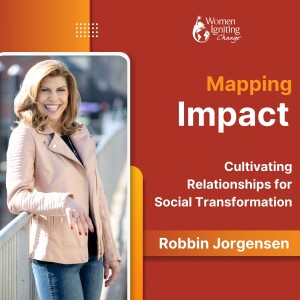
Monday Jun 24, 2024
Monday Jun 24, 2024
When it comes to creating real social impact and change, host Robbin Jorgensen explains, “It’s not something that you can do solo.” On this episode of Women Igniting Change, she walks you through her Social Impact Stakeholder Map, an eight-step process designed to help you understand the interconnections and interdependencies within and beyond your sphere of influence. Robbin asks you to rank people, institutions, and organizations in your life by their level of interest—those with whom you could potentially collaborate—and influence—those who can open doors for you that you can’t open yourself. You will also assess the strength of your current connections with each one.
Once you’ve identified your ideal network, the next step is to start reaching out. Robbin explains how to approach people and organizations professionally to lay the groundwork for success and make a lasting impression. Learn who your best points of contact are, the best social media platforms for networking, and the proper research to conduct before initiating contact.
Break out your markers and post-its and get ready to expand your footprint—and have fun in the process.
Quotes
“You’re going to need a multitude of individuals to help you create real social impact and change - it’s not something you can do solo.” (2:28 | Robbin Jorgensen)
“Always keep in mind that vision that you have for your social change as you’re thinking through these different questions.” (7:55 | Robbin Jorgensen)
“Now, I want you to dive into thinking through the centers of influence. Those are individuals and/or organizations that are really well-regarded in the space that you want to influence and impact, and they have a ton of credibility and potential to provide introductions for you and/or resources that you may not have access to. So, they tend to have really impressive decision-making power, and they have tremendous assets to help you achieve this social impact and vision.” (10:43 | Robbin Jorgensen)
Links
Social Impact Stakeholder Map
Connect with Robbin Jorgensen (She/Her):
Website: https://womenignitingchange.com
LinkedIn: https://www.linkedin.com/company/women-igniting-change/
LinkedIn: https://www.linkedin.com/in/robbinjorgensen/
Facebook: https://www.facebook.com/robbin.jorgensen/
Podcast production and show notes provided by HiveCast.fm
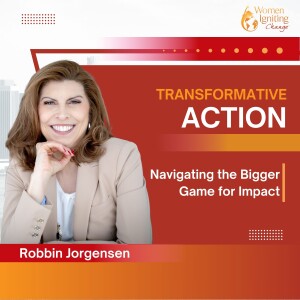
Monday Jun 17, 2024
Monday Jun 17, 2024
Change makers—believe it or not, we’re already halfway through 2024. Where are you in your mission toward creating lasting social change? Have you begun? To help you refocus and set your intentions for the rest of the year, Robbin revisits the episode where she introduced The Bigger Game, an innovation model designed to help you map out and intentionally design the change you want to make in the world. She walks you through the nine-square grid model, prompting you to consider essential questions like your deeper “why,” what scares you (in a good way), and what investments are needed for your mission to succeed.
Women, especially, often need a precise roadmap before taking risks. One setback can make us want to give up entirely. At the center of this model is the most important skill: taking bold action. Without it, as Robbin says, it’s all just a nice conversation.
Are you ready to take bold action? Join Robbin as she guides you through the questions that will help you build a long-lasting legacy.
Quotes
“And for women especially, this is the one that typically stops us—because we can’t see all 15 steps laid out in front of us as to how something is going to transpire, we talk ourselves out of it—’Nope, I can’t possibly do it.’ But when you’re playing a bigger game, you have to lean in and trust that the how is just going to show up as you take steps toward that bigger game and I promise you it does, every single time.” (2:59 | Robbin Jorgensen)
“Give yourself permission to dream and imagine that deep desire for social change that you want to put out there. It’s an invitation to turn that dial back up and dare to want for something more than just you.” (7:37 | Robbin Jorgensen)
“People who say to you, ‘That is the dumbest idea I’ve ever heard. You can’t possibly do that. What are you thinking?’ Those are allies, too, and here’s why: When they say something like that to you, I want your response to be, ‘Oh, yeah? Watch me. I’ve got this.’” (11:47 | Robbin Jorgensen)
“This legacy of what you’re putting out into the world lives beyond you. In the United States, for those of you who are familiar with this organization Mothers Against Drunk Driving, if I asked you who the two women were who started it, probably no one would be able to answer it. And we deliver The Bigger Game in workshops inside organizations and no one has known the answer to this. And it’s not that those two women are not important, what’s important is what they put out into the world sustained their involvement in it.” (12:34 | Robbin Jorgensen)
“Without bold action, the rest of it is just a really nice conversation.” (14:56 | Robbin Jorgensen)
Links
Connect with Robbin Jorgensen (She/Her):
Website: https://womenignitingchange.com
LinkedIn: https://www.linkedin.com/company/women-igniting-change/
LinkedIn: https://www.linkedin.com/in/robbinjorgensen/
Facebook: https://www.facebook.com/robbin.jorgensen/
Podcast production and show notes provided by HiveCast.fm
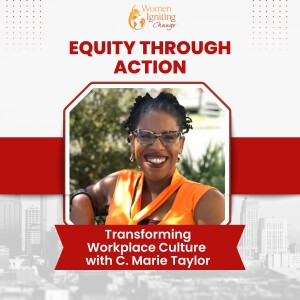
Monday Jun 10, 2024
Monday Jun 10, 2024
“How do we think about people and create an environment where we see each other as human beings contributing to the work?” C. Marie Taylor, President and Principal Consultant at Equity Through Action, is at the forefront of fostering safer, more inclusive workplaces. Her focus is on empowering historically marginalized individuals to be fully recognized and valued. In this episode of Women Igniting Change, she discusses with host Robbin Jorgensen the critical examination of the 3 Ps: people, policies, and practices. They explore how misalignments between company and personal values can impact workplace culture and the work itself, particularly in the pressing current climate of the U.S.
C. Marie often finds that leaders mistakenly believe they are exempt from needing change, not realizing they might benefit most. She illustrates how a leader’s satisfaction with the workplace culture can falsely imply that all employees feel the same. The episode delves into the complexities of navigating politics at every level and differentiating between policy and personal preference.
Tune in to today’s conversation for insights into the evolving workplace and learn how you can contribute to enhancing diversity and inclusion within your own organization.
Quotes
“Some of the misconceptions that folks really have going into this is that it can be solved with one or two trainings. That leadership doesn’t need to be part of the trainings. Seriously. They say, ‘Oh, no. This is for the middle level managers and the direct line folks,’ I say, ’No, it’s actually you. Bob. Jamal. Linda. It’s you and the things that you say and how you show up.” (11:44 | C. Marie Taylor)
“So there’s this misconception that, ‘Oh, we have this great culture because I’m happy and the leaders are happy. But you haven’t looked at anybody else. And so when I come in and the organization, the team comes in—because it’s not just me—comes in and says, ‘Well, here’s what’s happening from all the individuals, this is the collective culture that’s happening, not the one that you think is happening.’” (13:06 | C. Marie Taylor)
“Your humanity is tied up in my humanity, and if we don’t continue to recognize that, we’re going to continue to suffer. So it’s really pulling ourselves back and then just centering my humanity with yours and understanding that it’s tied together in work, in the community, whether I’m crossing the street or in the grocery store. If we could do that, the world would be a better place.” (27:11 | C. Marie Taylor)
Links
Connect with C. Marie Taylor:
Website: www.equitythroughaction.com
Connect with Robbin Jorgensen (She/Her):
Website: https://womenignitingchange.com
LinkedIn: https://www.linkedin.com/company/women-igniting-change/
LinkedIn: https://www.linkedin.com/in/robbinjorgensen/
Facebook: https://www.facebook.com/robbin.jorgensen/
Podcast production and show notes provided by HiveCast.fm
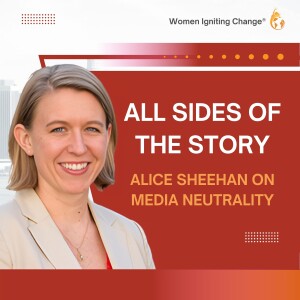
Monday Jun 03, 2024
Monday Jun 03, 2024
“Our goal is to reveal bias, not to tell you what to think,” says today’s guest Alice Sheehan, CEO and CFO of AllSides, an organization focused on strengthening our democracy with balanced news, media bias ratings and real conversations. On today’s episode of Women Igniting Change, she talks with host Robbin Jorgensen about AllSides’ mission to move away from the old ‘Ministry of Truth’ style news to bring people credible and unbiased news. She talks about the value of feedback, and the importance of diversity in all aspects of life.
She explains the various types of news bias, including the one that can make family members gathered around the dinner table feel like they are living on different planets. For its part, AllSides is working to draw people back toward civil discourse. Alongside the organization Living Room Conversations, it’s launched Mismatch, an initiative to help students in school learn how to have productive dialog with people with whom they disagree. Alice talks about the further impact AllSides has had in schools, particularly in light of the recent push toward including digital literacy in classroom curriculum.
Alice joined AllSides looking for a new sense of purpose. Her career is an example to so many women who are afraid to pivot: when change is calling you, don’t be afraid to answer.
Quotes
“Back in college, I had taken a vocations class and they had introduced me to this idea of asking yourself three questions: What are you good at? What makes you happy? What does the world need?’ And if you can find something that’s in the intersection of those three questions, that’s the sweet spot.” (2:09 | Alice Sheehan)
“It’s all about how we define ourselves as humans, which is in a multitude of ways. It’s race, it’s gender, it’s age, socioeconomic status, where I grew up, what the composition of my family was. All of that goes into perspective, and some of our perspective gets defined as politics, but a lot of it doesn’t have anything to do with politics.” (10:15 | Alice Sheehan)
“Credibility changes constantly with any outlet. So, they might get one story really right and they might get one story really, really wrong and print a retraction, or maybe they never do. And that happens across the board. Whereas we find that bias is more consistent. So, we have consistently focused on bias. Where we get a lot of feedback is people want us to focus on credibility.” (13:56 | Alice Sheehan)
“We see this a lot, actually, in our current context where the Right-leaning sources will really focus on a story that the Left won’t even mention. And the Left-leaning sources will focus on a story that the Right won’t even mention. And so then when people are talking to each other at their dinner table at Thanksgiving, it’s like they’re in two different worlds.” (17:59 | Alice Sheehan)
Links
Connect with Alice Sheehan:
https://www.allsides.com/unbiased-balanced-news
www.mismatch.org
Connect with Robbin Jorgensen (She/Her):Website: https://womenignitingchange.comLinkedIn: https://www.linkedin.com/company/women-igniting-change/LinkedIn: https://www.linkedin.com/in/robbinjorgensen/Facebook: https://www.facebook.com/robbin.jorgensen/
Podcast production and show notes provided by HiveCast.fm
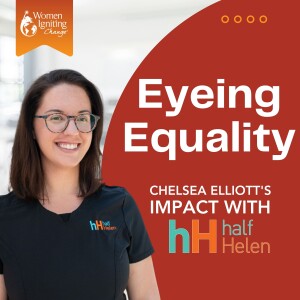
Monday May 27, 2024
Monday May 27, 2024
An early childhood vision test revealed that Chelsea Elliott was partially blind, a discovery that set her on a path to vision advocacy. In this episode of "Women Igniting Change," host Robbin Jorgensen talks with Chelsea, founder and Executive Director of half Helen and a Nexstar Media Remarkable Woman for 2024. Motivated by her own experiences, Chelsea has dedicated her life to advocating for earlier and more frequent vision screening and interventions for children.
Through her nonprofit, half Helen, Chelsea provides essential screening technology, consultations, and eyewear to the Austin community, focusing on mitigating severe vision issues and enhancing the quality of life for many, including seniors and those in underserved populations. She discusses her journey in developing mobile optometry clinics and her advocacy for legislation that supports the use of photo screening technology for all school-aged children across Texas.
Chelsea emphasizes that healthy vision is critical for all aspects of life and is often overlooked until a problem arises. She notes that 63% of children suffer from vision issues that are frequently misdiagnosed as learning or behavioral problems. Vision screenings also serve as vital tools for diagnosing other health issues within the body, such as diabetes, highlighting the importance of integrating eye care into primary health care.
Chelsea reflects on the value of perseverance, the importance of networking, and the power of collective action. She stresses that collaborative efforts ("we") are more impactful than individual endeavors ("I") in creating sustainable changes. Join us to hear how Chelsea's dedication to vision health is opening eyes across Texas and beyond.
Quotes
“It’s not enough to just give someone a pair of glasses. One of the biggest challenges I combat in my role is—people assume you should just be grateful. Just give them a pair of glasses and that solves their problem but if they don’t feel comfortable wearing them or they don’t like them, they will not wear them so you’re basically wasting resources. So, why not figure out how to offer a service that meets both of those needs and allows us to treat our patients with the dignity that they deserve?” (9:22 | Chelsea Elliott)
“I measure success when patients come back and say, ‘I feel safe cooking again’ or ‘I haven’t cut my hand, I haven’t burned myself because I can see now.’ One challenge I have with communicating our changing outcomes to funders is, your eyesight plays a role in every activity from the time you wake up to the time you go to sleep, so it’s really challenging to pinpoint what role your eyesight doesn’t play.” (14:21 | Chelsea Elliott)
“The eyeball is the only organ that allows you to look inside the body without cutting it open, which makes it so cool and makes it such an easy access point to learn. We can tell if you’re hypertensive, if you’ve had a stroke, if you have diabetes, we can tell several health conditions—cancer—by looking in the eye.” (20:31 | Chelsea Elliott)
Links
Connect with Chelsea Elliott:
Website: https://halfhelen.org/
Mission Video: https://www.youtube.com/watch?v=yjDlzeAn57E
Connect with Robbin Jorgensen (She/Her):
Website: https://womenignitingchange.com
LinkedIn: https://www.linkedin.com/company/women-igniting-change/
LinkedIn: https://www.linkedin.com/in/robbinjorgensen/
Facebook: https://www.facebook.com/robbin.jorgensen/
Podcast production and show notes provided by HiveCast.fm
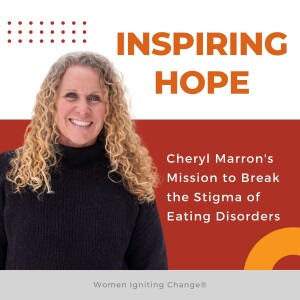
Monday May 20, 2024
Monday May 20, 2024
“I had to remove the mother aspect and remove the emotion, which was really hard in the beginning,” says Cheryl Marron, founder of Flutters of Hope, whose mission is to spread hope, compassion and understanding and to break the stigma surrounding eating disorders. She joins the Women Igniting Change podcast to tell the story of her daughter, who at the age of 11 began displaying symptoms of disordered eating. She shares the complicated and often frustrating process of finding help for her daughter, how her own background in counseling influenced that process, and some of the telltale signs and symptoms that something might be going on with your child.
Eating disorder recovery is an ongoing and often isolating process. Flutters of Hope provides baskets full of care items, resources as well as financial support and personalized notes assuring those afflicted–as well as their families–with a message that they are not alone. Cheryl details the staggering cost of recovery, and as a deeply spiritual person, the signs she received along the journey telling her to continue building Flutters of Hope.
What should a caretaker’s first concern be when caring for someone with an eating disorder, and what would she do differently if she could go back? Find out on today’s episode.
Quotes
“We just utilized what little was available to us. We had a counselor, we had a nutritionist, we had what would be called a behavioralist, but really wasn’t. We had the endocrinologist and we had the primary, all of which was unfortunate because they weren’t cohesive, they were not communicating. So each person, each therapy, was very different, different modalities, so we struggled with ‘Who do we listen to?’ Meanwhile, the eating disorder was getting extremely worse. She wasn’t making any progress.” (3:21 | Cheryl Marron)
At one point, I said, ‘All right, I’m not a mom. What would I tell my clients? How would I tell my clients to help her?’ So, I had to remove the mother aspect and remove the emotion, which was really hard in the beginning, and say, ‘No, this is what we’re doing, being very matter-of-fact, being very structured.” (7:00 | Cheryl Marron)
“You’re fluttering. You’re up and down. That’s where the flutter comes from. You’re never going to be in a straight line. With an eating disorder, there’s no, ‘I take a pill and I’m better.’ It doesn’t work that way. It’s ongoing.” (9:30 | Cheryl Marron)
“This illness costs a lot of money. It’s not something you budget. It’s long term, it’s ongoing and it does add up.” (15:00 | Cheryl Marron)
“Our words are powerful, and it only takes one comment or one situation to make that lightbulb go off. So, it’s really important that we try to educate as many people as we can.” (16:29 | Cheryl Marron)
Links
Connect with Cheryl Marron:
Website: https://www.fluttersofhopeinc.org
Connect with Robbin Jorgensen (She/Her):
Website: https://womenignitingchange.com
LinkedIn: https://www.linkedin.com/company/women-igniting-change/
LinkedIn: https://www.linkedin.com/in/robbinjorgensen/
Facebook: https://www.facebook.com/robbin.jorgensen/
Podcast production and show notes provided by HiveCast.fm

Women Igniting Change®
Founder and CEO of Women Igniting Change®, is your host. A former corporate executive, passionate human and women's rights activist, and global speaker, who has worked with women leaders in 14 countries on 6 continents believes that unleashing the contribution of women is one of the key drivers to moving business and humanity forward.


